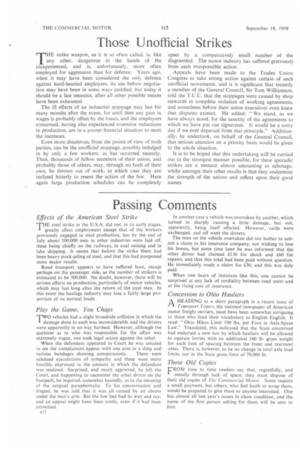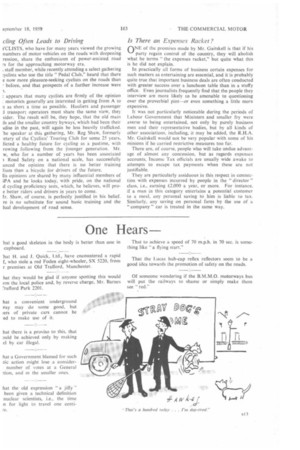Passing Comments
Page 46

Page 47

If you've noticed an error in this article please click here to report it so we can fix it.
Effects of the American Steel Strike
THE steel strike in the U.S.A. did not, in its early stages, greatly affect employment except that of the workers previously engaged in steel production, but by the end of July about 100,000 men in other industries were laid off, these being chiefly on the railways, in coal mining and in lake shipping. It seems that before the strike there had been heavy stock-piling of steel, and that this had postponed more major results.
Road transport appears to have suffered least, except perhaps on the passenger side, as the number of strikers is estimated to be 500,000. No doubt, however, there will be • serious effects on production, particularly of motor vehicles, which may last long after the return of the steel men. In this event the haulage industry may lose a fairly large proportion of its normal loads.
Play the Game, You Chaps
Two vehicles had a slight broadside collision in which the damage done to each was inconsiderable and the drivers were apparently in no way harmed. However, although the question as to who was responsible for the affair was extremely vague, one took legal action against the other.
When the defendant appeared in Court he was amazed to see the complainant appear with one arm in a sling and various bandages showing conspicuously. There were subdued ejaculations of sympathy and these were more forcibly expressed in the amount in which the defendant was mulcted. Surprised, and much aggrieved, he left the Court, and happening to encounter the other driver on the footpath, he inquired, somewhat heatedly, as to the meaning of the surgical paraphernalia. To his consternation and disgust, he was told that it was all caused by an abcess under the man's arm. But the law had had its way and say, and an appeal might have been costly, even if it had been permitted.
n12 In another case a vehicle was overtaken by another, which turned in sharply causing a little damage, but not, apparently, being itself affected. However, cards were exchanged, and off went the drivers.
The man on the vehicle overtaken did not bother to submit a claim to his insurance company, not wishing to lose his bonus, but some time later he was informed that the other driver had claimed £150 for shock and £60 for repairs, and that this total had been paid without question. He immediately made a claim for £30, and this was duly paid.
When one hears of instances like this, one cannot be surprised at any lack of cordiality between road users and at the rising cost of insurance.
Concession to Ohio Hauliers
A HEADING to a short paragraph in a recent issue of " Transport Topics, the national newspaper of American motor freight carriers, must have been somewhat intriguing to those who limit their vocabulary to English English. It read: "Ohio Hikes Limit 100 lbs. per Foot in Axle-Space Law." Translated, this indicated that the State concerned had endorsed a new law by which hauliers will be allowed to operate lorries with an additional 100 lb. gross weight for each foot of spacing between the front and rearmost axles. There is, however, to be no change in total axle load limits, nor in the State gross limit of 78,000 lb.
Those Old Copies
FROM time to time readers say that, regretfully, and usually through lack of space, they must dispose of their old copies of The Commercial Motor. Some require a small payment, but others, who feel loath to scrap them, would be prepared to give them to anyone interested. One has almost all last year's issues in clean condition, and the name of the first person asking for them will be sent to him.
cling Often Leads to Driving
(CLISTS, who have for many years viewed the growing numbers of motor vehicles on the roads with deepening ression, share the enthusiasm of power-assisted road rs for the approaching motorway era.
, staff member, while recently attending a select gathering ;yclists who use the title "Pedal Club," heard that there e now more pleasure-seeking cyclists on the roads than before, and that prospects of a further increase were
t appears that many cyclists are firmly of the opinion motorists generally are interested in getting from A to a as short a time as possible. Hauliers and passenger J transport operators must share the same view, they sider. The result will be, they hope, that the old main dis and the smaller country byway, which had been their iodise in the past, will again be less heavily trafficked. he speaker at this gathering, Mr. Reg Shaw, formerly 'etary of the Cyclists' Touring Club for some 25 years, licted a healthy future for cycling as a pastime, with rowing following from the Younger generation. Mr. w, who for a number of years has been associated
Road Safety on a national scale, has successfully anced the opinion that there is no better training hum than a bicycle for drivers of the future.
us opinions are shared by many influential members of iPA and he looks today, with pride, on the national
d cycling proficiency tests, which, he believes, will pro e better riders and drivers in years to come.
Er. Shaw, of course, is perfectly justified in his belief. re is no substitute for sound basic training and the lual development of road sense.
Is There an Expenses Racket ?
nNE of the promises made by Mr. Gaitskell is that if his party regain control of the country, they will abolish what he terms "the expenses racket," but quite what this is he did not explain.
In practically all forms of business certain expenses for such matters as entertaining are essential, and it is probably quite true that important business deals are often conducted with greater success over a luncheon table than in a stuffy office. Even journalists frequently find that the people they interview are more likely to be amenable to questioning over the proverbial pint—or even something a little more expensive.
It was not particularly noticeable during the periods of Labour Government that Ministers and smaller fry were averse to being entertained, not only by purely business men and their representative bodies, but by all kinds of other associations, including, it may be added, the R.H.A. Mr. Gaitskell would not be very popular with some of his minions if he carried restrictive measures too far.
There are, of course, people who will take undue advantage of almost any concession, but as regards expenses accounts, Income Tax officials are usually wide awake to attempts to escape tax payments when these are not justifiable.
They are particularly assiduous in this respect in connection with expenses incurred by people in the " director " class, i.e., earning 12,000 a year, or more. For instance, if a man in this category entertains a potential customer to a meal, any personal saving to him is liable to tax. Similarly, any saving on personal fares by the use of a " company" car is treated in the same way.




































































































































